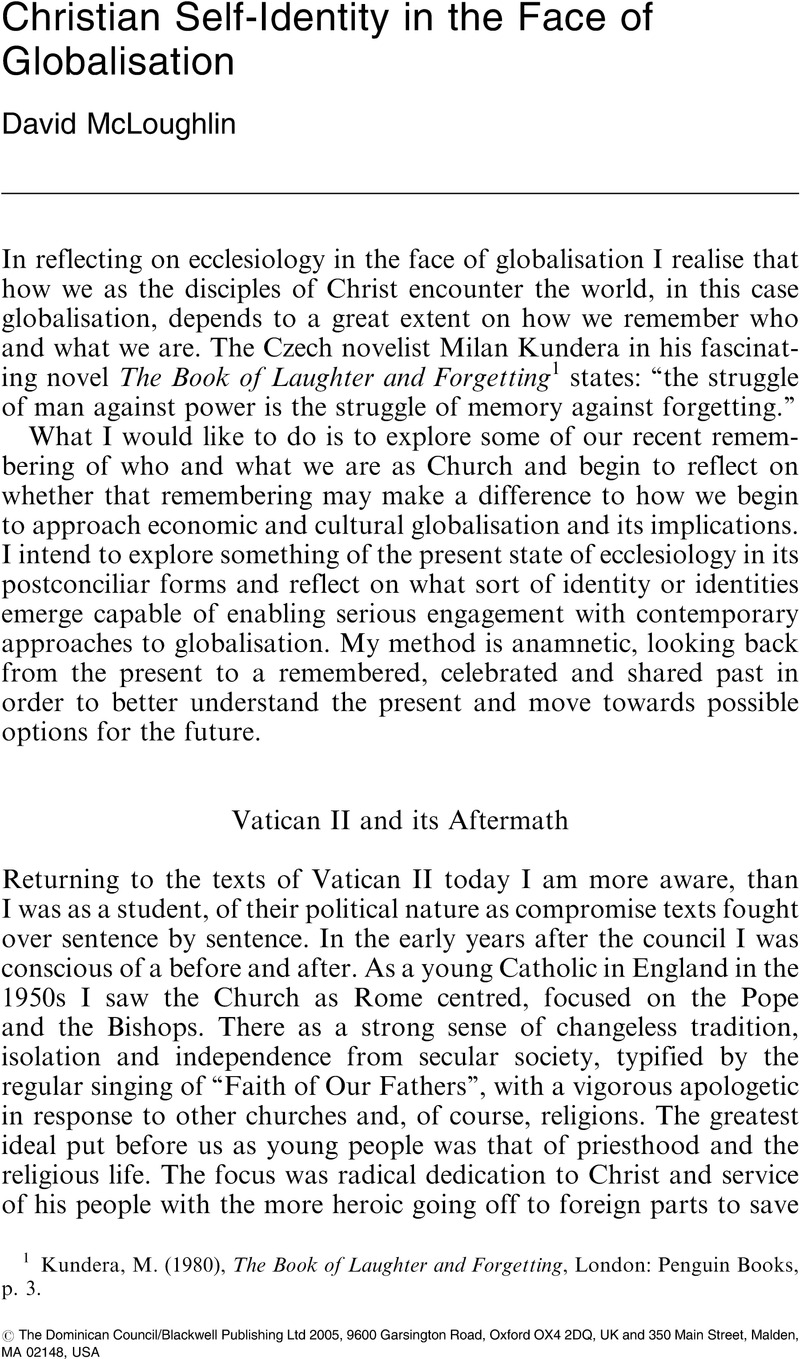No CrossRef data available.
Article contents
Christian Self‐Identity in the Face of Globalisation
Published online by Cambridge University Press: 01 January 2024
Abstract

- Type
- Catholic Theological Association 2004 Conference papers
- Information
- Copyright
- Copyright © The Dominican Council/Blackwell Publishing Ltd 2005
References
1 Kundera, M. (1980), The Book of Laughter and Forgetting, London: Penguin Books, p. 3Google Scholar.
2 H., Vorgrimler, (ed)(1969)Commentary on the Documents of Vatican II, vols. 1–5, London: Burns and OatesGoogle Scholar.
3 Especially Christ and Time, London: SCM 1950Google Scholar.
4 Cited in Chenu, M‐D., “The New Awareness of the Trinitarian Basis of the Church,”Concilium 146 (1981), 15Google Scholar.
5 Jeanrond, W. G. “ Community and Authority: The Nature and Implication of the Authority of Christian Community,” 91–93. In On Being the Church: Essays on the Christian Community, edited by Gunton, C. & Hardy, D. (1989) Edinburgh: T. & T. Clark, 81–109Google Scholar.
6 Cf. the fine treatment of this in Dych, W.V., (1999)Thy Kingdom Come: Jesus and the Reign of God, NY: Crossroad, pp. 86–89Google Scholar.
7 Duquoc, C. “Jesus Christus, Mittelpunkt des Europa von Morgen,” in Huenermann, P. ed., (1993), Das Neue Europa, Herausforderung fur Kirche und Theologie(QD 144), Frieburg i. Br., p. 105fGoogle Scholar.
8 Herrlichkeit I–III, Einsiedeln: Johannes Verlag 1965–69Google Scholar. English Translation, Vols. I–VII, Edinburgh: T. & T. Clark. 1982–91.
9 Davies, O. (2001)A Theology of Compassion, Michigan: EerdmansGoogle Scholar.
10 Congar, Y. (1983), I Believe in the Holy Spirit vols. 1–3, London: ChapmanGoogle Scholar.
11 Beautifully pondered in Williams, Rowan’Resurrection(1982) London: DLT pp. 7–28Google Scholar.
12 This paragraph is based on Limouris, G. “The Church as Mystery and Sign in Relation to the Holy Trinity in Ecclesiological Perspectives” p. 29 in G., Limouris, ed., (1986)Church‐Kingdom‐World: the church as Mystery and Prophetic Sign, Faith and Order Paper 130, Geneva: World Council of ChurchesGoogle Scholar.
13 Ibid.
14 Dunn, J, (1998)The Christ and the Spirit, vol. 2, Pneumatology, Edinburgh: T. & T. Clark p. 252Google Scholar.
15 D, Bonhoeffer, (1958)Gesammelte Schriften, vol.3, Muenchen: Kaiser Verlag p. 274Google Scholar, cited in Fuellenbach, J. (2002), Church: Community of the Kingdom, NY: Orbis p. 62Google Scholar.
16 Kasper, W. ‘Kirche als Sakrament des Geistes’, pp. 13–55 in Kasper, W. & Sauter, G. (1976)Kirche, Ort des Geistes, Freiburg: HerderGoogle Scholar.
17 Although it's worth noting the careful caveat of Clare Watkins in “Objecting to Koinonia. The Question of Christian Discipleship Today and Why Communion is not the Answer”, in Louvain Studies 28 (2003) pp. 326–343CrossRefGoogle Scholar.
18 Fuellenbach, J. (2002), Church: Community for the Kingdom, NY: Orbis, p. 64Google Scholar.
19 Cf. the useful survey of Doyle, Dennis M. (2000), Communion Ecclesiology, NY: OrbisGoogle Scholar.
20 International Theological Commission: Texts and Documents 1969–85, ed. Sharkey, M. (1989) San Francisco: Ignatius Press p. 302 and p. 303.
21 For an excellent short critique of the clerical and hierarchical centred nature of the ITC cf. Munoz, R. “The Ecclesiology of the International Theological Commission” pp. 37–43 of Concilium 188, (6/1986).
22 CF. Schnackenburg, R. “Signoria e regno di Dio nell’annuncio di Gesu e della Chiesa delle Origini,”Communio 86 (1986), 41–42.
23 “World and Church”, in Sacramentum Mundi, 8 vols., ed. Rahner, K. (1975) NY: Seabury, 1:348Google Scholar.
24 I draw here on ideas developed by Jose Ignacio Gonzalez Faux in his article “The Utopia of the Human Family: The Universalisation of the Truly human as Real Globalisation” pp. 91–98 of Concilium(5/2001).
25 Rifkin, J. (1965)The End of Work, NY and London pp. 42ffGoogle Scholar.
26 Sobrino, J. “Redeeming Globalisation through its Victims” pp. 104–114 of Concilium(5/2001).
27 Words Romero used in a homily of 19th June 1977 to the surviving men and women peasants of Aguilares whose fellow inhabitants had been massacred.
28 Pieris, A., ‘Cristo mas alla dei Dogma. Hacer Cristologia en el contexto de las religiones de los pobres’RLT, 52(2001), p. 16.
29 Veng, M., ‘Iglesias y solidaridad con los pobres de Africa: empobrecimiento antropologico’ in Identidad Africana y Cristiana(Estella 1999), pp. 273f. cited in Sobrino op.cit.
30 Novak, M. & Cooper, J.W. (eds), (1981)The Corporation, a Theological Enquiry, Washington, p. 203Google Scholar.
31 Benjamin, W. (1969)Illuminations: Essays and Reflections, NY: Schocken Books, p. 255Google Scholar.
32 Orwell, G. (1983)Nineteen Eighty‐four, Harmondsworth: Penguin, p. 34Google Scholar.
33 Dubus, A., “A Father's Story” inBreslin, J. ed., The substance of things Hoped For, New York: Doubleday, 1987, p. 152Google Scholar. Kindly shared with me by Rev. Dr. Philip Caldwell of Ushaw college.




